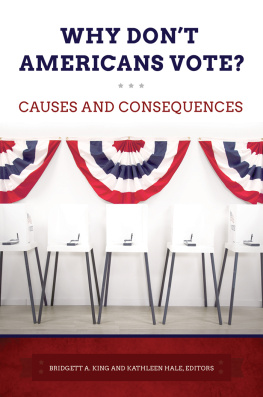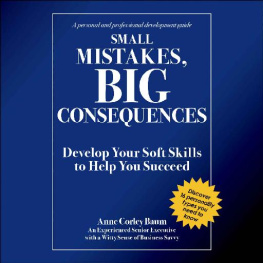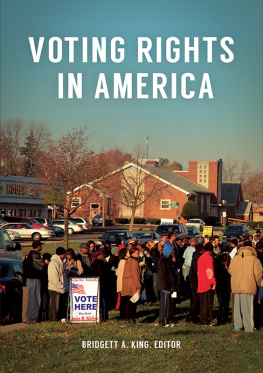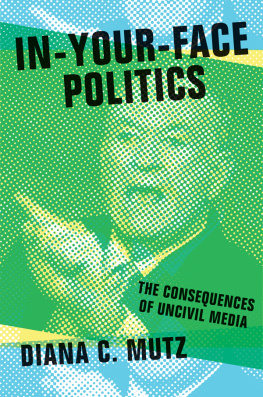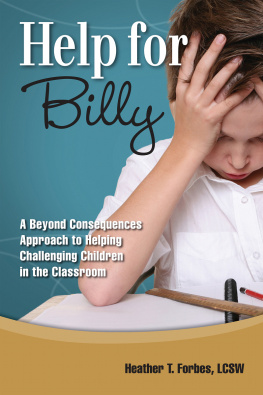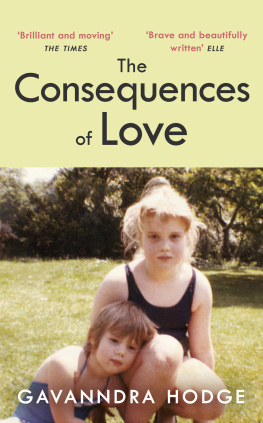King Bridgett A - Why Dont Americans Vote? Causes and Consequences: Causes and Consequences
Here you can read online King Bridgett A - Why Dont Americans Vote? Causes and Consequences: Causes and Consequences full text of the book (entire story) in english for free. Download pdf and epub, get meaning, cover and reviews about this ebook. City: Santa Barbara, year: 2016, publisher: ABC-CLIO, LLC, genre: Politics. Description of the work, (preface) as well as reviews are available. Best literature library LitArk.com created for fans of good reading and offers a wide selection of genres:
Romance novel
Science fiction
Adventure
Detective
Science
History
Home and family
Prose
Art
Politics
Computer
Non-fiction
Religion
Business
Children
Humor
Choose a favorite category and find really read worthwhile books. Enjoy immersion in the world of imagination, feel the emotions of the characters or learn something new for yourself, make an fascinating discovery.
- Book:Why Dont Americans Vote? Causes and Consequences: Causes and Consequences
- Author:
- Publisher:ABC-CLIO, LLC
- Genre:
- Year:2016
- City:Santa Barbara
- Rating:5 / 5
- Favourites:Add to favourites
- Your mark:
- 100
- 1
- 2
- 3
- 4
- 5
Why Dont Americans Vote? Causes and Consequences: Causes and Consequences: summary, description and annotation
We offer to read an annotation, description, summary or preface (depends on what the author of the book "Why Dont Americans Vote? Causes and Consequences: Causes and Consequences" wrote himself). If you haven't found the necessary information about the book — write in the comments, we will try to find it.
King Bridgett A: author's other books
Who wrote Why Dont Americans Vote? Causes and Consequences: Causes and Consequences? Find out the surname, the name of the author of the book and a list of all author's works by series.
Why Dont Americans Vote? Causes and Consequences: Causes and Consequences — read online for free the complete book (whole text) full work
Below is the text of the book, divided by pages. System saving the place of the last page read, allows you to conveniently read the book "Why Dont Americans Vote? Causes and Consequences: Causes and Consequences" online for free, without having to search again every time where you left off. Put a bookmark, and you can go to the page where you finished reading at any time.
Font size:
Interval:
Bookmark:

Why Dont Americans Vote?
Causes and Consequences
Bridgett A. King and Kathleen Hale, Editors

Copyright 2016 by ABC-CLIO, LLC
All rights reserved. No part of this publication may be reproduced, stored in a retrieval system, or transmitted, in any form or by any means, electronic, mechanical, photocopying, recording, or otherwise, except for the inclusion of brief quotations in a review, without prior permission in writing from the publisher.
Library of Congress Cataloging-in-Publication Data
Names: King, Bridgett A.
Title: Why dont Americans vote? : causes and consequences / Bridgett A. King and Kathleen Hale, Editors.
Description: Santa Barbara, California : ABC-CLIO, [2016] | Includes bibliographical references and index.
Identifiers: LCCN 2016011826 | ISBN 9781440841156 (hardcopy : alk. paper) | ISBN 9781440841163 (ebook)
Subjects: LCSH: VotingUnited States. | ElectionsUnited States. | United StatesPolitics and government.
Classification: LCC JK1976 .K56 2016 | DDC 324.973dc23
LC record available at https://lccn.loc.gov/2016011826
ISBN: 9781440841156
EISBN: 9781440841163
20 19 18 17 161 2 3 4 5
This book is also available as an eBook.
ABC-CLIO
An Imprint of ABC-CLIO, LLC
ABC-CLIO, LLC
130 Cremona Drive, P.O. Box 1911
Santa Barbara, California 93116-1911
www.abc-clio.com
This book is printed on acid-free paper 
Manufactured in the United States of America
Dedicated in loving memory to Dorsey Ward.
Bridgett A. King
Megan M. Ruxton and Kyle L. Saunders
Gayle Alberda
Krysha Gregorowicz and Thad E. Hall
Jodi Benenson, Margaret Brower, and Nancy L. Thomas
Kelly Krawczyk
Anne M. Cizmar
Keith Smith and Dari Sylvester-Tran
Thad E. Hall, Krysha Gregorowicz, and Leah Alley
Priscilla L. Southwell
Elizabeth Bergman and Dari Sylvester-Tran
Ryan Voris
Bridgett A. King
Linda M. Trautman
Christopher N. Lawrence
Dominic D. Wells
Robert Postic
Benjamin W. Cole
Robert C. Chalwell Jr.
Priscilla L. Southwell
Mitchell Brown
Kathleen Hale
Concerns about voter turnout in the United States are not new. To the contrary, they date back to the late 19th and early 20th century. Prior to the election of 1896, voter turnout in the United States was typically high, frequently over 80 percent (.). In the elections that followed the presidential election of 1896, however, voter turnout in the nation began to decrease. From the presidential election of 1896 to the presidential election of 1912, turnout dropped from almost 80 percent to less than 60 percent nationally. As with contemporary American elections, turnout was even lower in midterm elections during this period.
Potential explanations for this decline included disinterest, lack of party competition, and legal constraints. In response, considerations were given to compulsory voting measures and scholars began to study get out the vote (GOTV) campaigns targeting non-voters, who were disproportionately poor and working class. Turnout was also low among women, immigrants, and their children (Keyssar 2000, 185). Due to the influence of classist and partisan biases, however, the recognition of steadily declining turnout did not result in extensive proactive efforts to enfranchise more of the citizen population.
In the 21st century, concerns persist regarding low voter turnout. With few exceptions, turnout in American presidential elections hovers around 5060 percent. In midterm elections, turnout is often lower than 50 percent (see ).
More than a century after concerns over voter turnout first emerged, politicians, pundits, and academics continue to attempt to understand why Americans do not exercise their right to vote in greater numbers. As with initial concerns over voter turnout, which produced various potential explanations and solutions, a variety of explanations and solutions have been proposed to explain the state of voter turnout in contemporary American politics. Although most policy solutions have addressed matters related to voter eligibility and access to registration and voting, other proposed solutions have focused on other potential factors, such as voter mobilization, lack of interest, and limited candidate options.
Over the course of American history, voting has been described as a right, privilege, and duty. Each of these terms prescribes a certain expectation regarding who should participate. For much of American history, the ability to participate in the franchise has been limited by legal restrictions. The right to vote as we know it today has changed and evolved over time, shaped by legislation in individual states, the U.S. Congress, and decisions by the U.S. Supreme Court.
Prior to the founding of the nation, colonies determined their own suffrage laws. These laws traditionally stemmed from British tradition. From this period, perhaps the most notable voting provision was the restriction of voting to adult men who owned property. The necessity of property ownership was justified on two grounds. First, individuals who owned property were viewed as having a unique stake in society. Because of this, it was expected that they would not vote in subversive ways that would undermine their own best interest. Second, property owners were independent. Because they had the means to own land, they were not dependent upon or in debt to anyone and thus could make decisions independently, or at least, independent of influence. In colonies where economic opportunities were believed to be unbounded, anyone legally permitted to own land but who failed to acquire property was considered to be of questionable competence. The importance of having a stake in the colony or state in which one voted produced additional requirements for residency and citizenship. Finally, to ensure that those who were dependent were not allowed to vote, several colonies barred servants and paupers. Additionally, women were excluded because they were not believed to have the necessary intellectual and emotional capabilities to navigate the world of politics and policy.
Exclusion from and inclusion in the franchise also depended on social status. In the South, freedmen (African descendants or Amerindian descendants) were excluded, and in some states, participation was determined by religious affiliation. For example, in Massachusetts during the 17th century only members of the Congregational Church could vote. In the 18th century, Catholics were disenfranchised in five states and Jews were similarly disenfranchised in four states. Variation in suffrage laws was also rooted in geography. In rural areas, the ability to participate was often determined by property ownership and residency; in larger cities, those granted political citizenship were often those who had commercial affairs within city limits rather than a residence. Thus, in many instances, only those who contributed to the municipalitys finances were able to participate.
During Americas earliest history, systems of voting varied from colony to colony as well as from city to county and ultimately from state to state. During this time, values varied about who had the right to participate in a democracy and these values influenced voting laws and practices. Across the 13 colonies, laws were being used to shape democracy in very different ways. As time progressed, some colonies became more lenient while others became more restrictive. Religious restrictions were lifted in the late 17th and early 18th centuries, cities began to allow land owners to vote as opposed to just those with commercial enterprises, and property requirements were reduced in Massachusetts and Virginia. In other colonies such as Pennsylvania, Rhode Island, and Virginia, the property requirements became more restrictive and severe. As time passed and the original 13 colonies became todays 50 states, legal variations governing access to the franchise continued to persist.
Font size:
Interval:
Bookmark:
Similar books «Why Dont Americans Vote? Causes and Consequences: Causes and Consequences»
Look at similar books to Why Dont Americans Vote? Causes and Consequences: Causes and Consequences. We have selected literature similar in name and meaning in the hope of providing readers with more options to find new, interesting, not yet read works.
Discussion, reviews of the book Why Dont Americans Vote? Causes and Consequences: Causes and Consequences and just readers' own opinions. Leave your comments, write what you think about the work, its meaning or the main characters. Specify what exactly you liked and what you didn't like, and why you think so.

